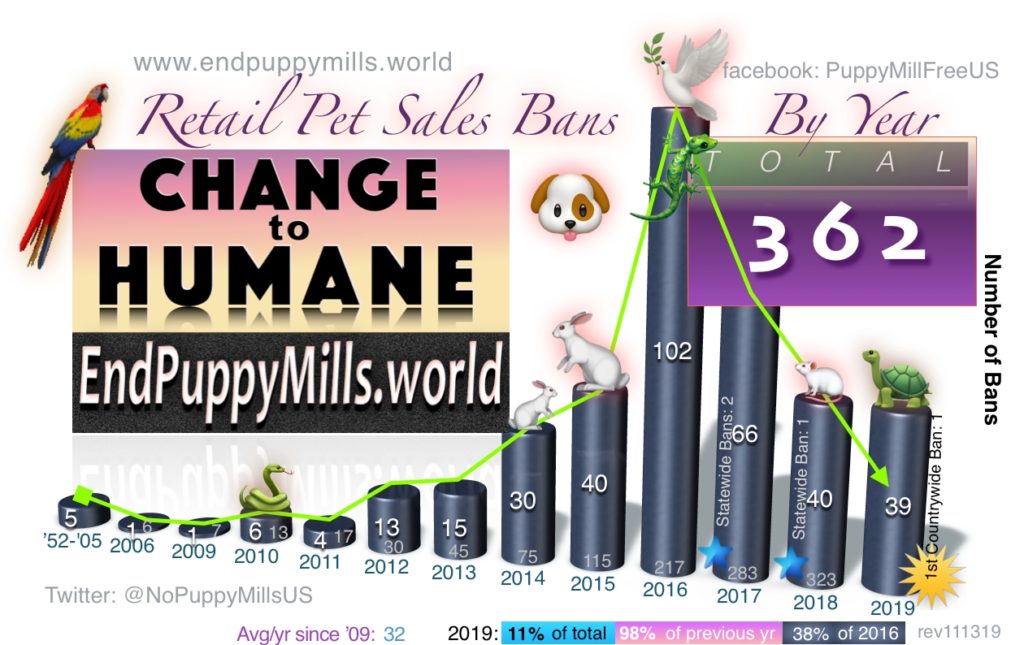Re-examing puppy mill ban numbers/history
Activists in Albuquerque, New Mexico, have long been honored for having the cajones to pass the first ban on puppy and kitten store sales in the world in 2006.
South Lake Tahoe, California, activist Dawn Armstrong of the local humane society, started a movement when the language used in the 2nd ban in the US was repeated throughout the country and still is to this day with the city name as fill in the blank:
6.55.350 Retail sale of dogs and cats in pet stores prohibited.
Municipal code: https://bit.ly/2w7PVrf
…
C. Prohibition. No pet store operator or pet store shall display, sell, deliver, offer for sale or adoption, barter, auction, give away, or otherwise dispose of cats or dogs in the city of South Lake Tahoe.
But after another exhaustive round of puppy store bans research, we or saying to ourselves, “Not so fast….”
When I first started this project in 2013, I counted jurisdictions in Florida that had previously passed bans. Not able to find the year they had done so, I lumped them in with 2011. Turns out 4 of those villages and townships passed a ban long ago. Way long ago. 1952 long ago. 67 years ago.
§ 91.11 – Keeping dogs for commercial purposes prohibited; exception.
Municipal code: http://bit.ly/1LDXDtm
It shall be unlawful for any person, firm, association, or corporation to house or keep dogs for commercial purposes in the Village other than a licensed veterinary doctor which such doctor has dogs in his custody and control solely for the purpose of providing them with medical care and attention.
(1964 Code, § 4-2; Ord. 69, passed 7-17-52)
Boom. Bingo. End of discussion.
And, frankly, that shouldn’t be too surprising. Many changes at the USDA were underway and to this day still brick-up the foundation of farming, animal husbandry and slaughter.
World War II’s massive deployment of US troops into numerous war zones in Europe, Africa and the Eastern Hemisphere—the vast Japanese theater stretched from The Philippines through Burma and included bombings as far south as Townsville, Australia. But, suddenly, the war was over and the time came apace to bring the thousands of people involved in the war effort back home: the veterans of combat, the medics, the admins, the the service sector preparing food, clothing, shelter for the troops and admins, the mechanics of planes, trucks, ships, the ordinance keepers, the navigators and radio operators, indeed even the Code Talkers were on their way back to their hometowns en masse. Many US agencies stepped up to find work for those returning who did not have a career or family business to return to.
Farmers needed help. Single gentlemen returning might be interested in helping out on a farm. Or a ranch. Or a puppy mill.
That’s right, puppy mills were going strong after the war. The US economy was booming, as were babies, and returning soldiers saw farming as an opportunity to work with animals out in the country. A quiet life after the carnage in which many had been ensconced. For some, a tranquil life among animals was just what they wanted.
It is no surprise that as early as 1952, seven years after the great return, some communities might feel the need to curb a store when there were likely plenty of pups to go around anyway. Or perhaps there was some other now hidden reason why a handful of cities in Florida felt the need to curb dog purchasing.
Enter North Bay Village, Florida, which, on 7/17/1952, passed Ordinance #69:
§ 91.11 – Keeping dogs for commercial purposes prohibited; exception.
Municipal code: http://bit.ly/1LDXDtm
It shall be unlawful for any person, firm, association, or corporation to house or keep dogs for commercial purposes in the Village other than a licensed veterinary doctor which such doctor has dogs in his custody and control solely for the purpose of providing them with medical care and attention.
(1964 Code, § 4-2; Ord. 69, passed 7-17-52)
Opa-Locka followed suit in May of 1955, as did Lauderdale Lakes in the spring 1963.
Flagler Beach, Florida, outlawed all animal sales at Christmas 2002.
Coral Gables did this in September 2005:
Sec. 10-38. – Keeping dogs commercially prohibited.
Municipal code
It shall be unlawful for any person to keep dogs for commercial purposes in the city other than a licensed veterinary doctor when such doctor has dogs in his or her custody and control solely for the purpose of providing medical care and attention.
That leads us to our most current “Bans By Year” graph where we lump the above ordinances into a single span of years, 1952-2005

